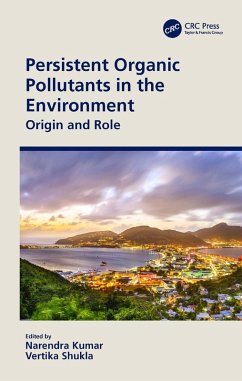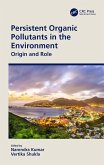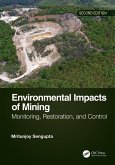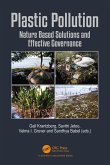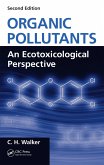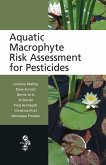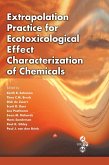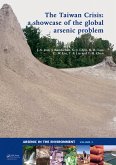Persistent Organic Pollutants in the Environment (eBook, ePUB)
Origin and Role
Redaktion: Kumar, Narendra; Shukla, Vertika
68,95 €
68,95 €
inkl. MwSt.
Sofort per Download lieferbar

34 °P sammeln
68,95 €
Als Download kaufen

68,95 €
inkl. MwSt.
Sofort per Download lieferbar

34 °P sammeln
Jetzt verschenken
Alle Infos zum eBook verschenken
68,95 €
inkl. MwSt.
Sofort per Download lieferbar
Alle Infos zum eBook verschenken

34 °P sammeln
Persistent Organic Pollutants in the Environment (eBook, ePUB)
Origin and Role
Redaktion: Kumar, Narendra; Shukla, Vertika
- Format: ePub
- Merkliste
- Auf die Merkliste
- Bewerten Bewerten
- Teilen
- Produkt teilen
- Produkterinnerung
- Produkterinnerung

Bitte loggen Sie sich zunächst in Ihr Kundenkonto ein oder registrieren Sie sich bei
bücher.de, um das eBook-Abo tolino select nutzen zu können.
Hier können Sie sich einloggen
Hier können Sie sich einloggen
Sie sind bereits eingeloggt. Klicken Sie auf 2. tolino select Abo, um fortzufahren.

Bitte loggen Sie sich zunächst in Ihr Kundenkonto ein oder registrieren Sie sich bei bücher.de, um das eBook-Abo tolino select nutzen zu können.
The present book regarding Persistent Organic Pollutants (POPs) focusses on the sources, atmospheric behaviour, terrestrial and aquatic food chain transfer, human exposure and fate aspects of this important class of chemicals including topical issues like temporal trends in contamination and chemical characteristics of individual POPs.
- Geräte: eReader
- ohne Kopierschutz
- eBook Hilfe
- Größe: 3.86MB
Andere Kunden interessierten sich auch für
![Persistent Organic Pollutants in the Environment (eBook, PDF) Persistent Organic Pollutants in the Environment (eBook, PDF)]() Persistent Organic Pollutants in the Environment (eBook, PDF)68,95 €
Persistent Organic Pollutants in the Environment (eBook, PDF)68,95 €![Environmental Impacts of Mining (eBook, ePUB) Environmental Impacts of Mining (eBook, ePUB)]() Mritunjoy SenguptaEnvironmental Impacts of Mining (eBook, ePUB)47,95 €
Mritunjoy SenguptaEnvironmental Impacts of Mining (eBook, ePUB)47,95 €![Plastic Pollution (eBook, ePUB) Plastic Pollution (eBook, ePUB)]() Plastic Pollution (eBook, ePUB)34,95 €
Plastic Pollution (eBook, ePUB)34,95 €![Organic Pollutants (eBook, ePUB) Organic Pollutants (eBook, ePUB)]() C. H. WalkerOrganic Pollutants (eBook, ePUB)63,95 €
C. H. WalkerOrganic Pollutants (eBook, ePUB)63,95 €![Aquatic Macrophyte Risk Assessment for Pesticides (eBook, ePUB) Aquatic Macrophyte Risk Assessment for Pesticides (eBook, ePUB)]() Lorraine MaltbyAquatic Macrophyte Risk Assessment for Pesticides (eBook, ePUB)63,95 €
Lorraine MaltbyAquatic Macrophyte Risk Assessment for Pesticides (eBook, ePUB)63,95 €![Extrapolation Practice for Ecotoxicological Effect Characterization of Chemicals (eBook, ePUB) Extrapolation Practice for Ecotoxicological Effect Characterization of Chemicals (eBook, ePUB)]() Extrapolation Practice for Ecotoxicological Effect Characterization of Chemicals (eBook, ePUB)63,95 €
Extrapolation Practice for Ecotoxicological Effect Characterization of Chemicals (eBook, ePUB)63,95 €![The Taiwan Crisis: a showcase of the global arsenic problem (eBook, ePUB) The Taiwan Crisis: a showcase of the global arsenic problem (eBook, ePUB)]() Jiin-Shuh JeanThe Taiwan Crisis: a showcase of the global arsenic problem (eBook, ePUB)51,95 €
Jiin-Shuh JeanThe Taiwan Crisis: a showcase of the global arsenic problem (eBook, ePUB)51,95 €-
-
-
The present book regarding Persistent Organic Pollutants (POPs) focusses on the sources, atmospheric behaviour, terrestrial and aquatic food chain transfer, human exposure and fate aspects of this important class of chemicals including topical issues like temporal trends in contamination and chemical characteristics of individual POPs.
Dieser Download kann aus rechtlichen Gründen nur mit Rechnungsadresse in A, B, BG, CY, CZ, D, DK, EW, E, FIN, F, GR, HR, H, IRL, I, LT, L, LR, M, NL, PL, P, R, S, SLO, SK ausgeliefert werden.
Produktdetails
- Produktdetails
- Verlag: Taylor & Francis
- Seitenzahl: 378
- Erscheinungstermin: 30. September 2021
- Englisch
- ISBN-13: 9781000415209
- Artikelnr.: 62517188
- Verlag: Taylor & Francis
- Seitenzahl: 378
- Erscheinungstermin: 30. September 2021
- Englisch
- ISBN-13: 9781000415209
- Artikelnr.: 62517188
- Herstellerkennzeichnung Die Herstellerinformationen sind derzeit nicht verfügbar.
Narendra Kumar has obtained his M.Sc. and Ph.D. degree in Environmental Science from the Babasaheb Bhimrao Ambedkar (Central) University, Lucknow, India. Dr Kumar is an active researcher with 18 years of post graduate teaching and research experience. He started his career as Lecturer in the Department of Environmental Science, Institute of Bioscience and Biotechnology, C.S.J.M. University, Kanpur, U.P., India. Thereafter, in 2005 he has joined as Assistant Professor in the Department of Environmental Science, Babasaheb Bhimrao Ambedkar University, Lucknow. He has published more than 40 research papers and 20 book chapters with reputed National and International publishers. Five Ph.D. degree has been awarded under the supervision of Dr. Kumar and currently three research scholars are working under his guidance for doctoral degree. In addition Dr. Kumar has guided more than 40 students for their M.Sc. dissertation work. He has coedited 4 books; 'Environmental Concerns and Sustainable Development' in two volumes, 'Plant Adaptation Strategies in Changing Environment' and 'Phyto and Rhizoremediation' which are published by Springer. Vertika Shukla did M.Sc. in Organic Chemistry and Ph.D. in 2003 on the topic "Chemical Study of Macrolichens of Garhwal Himalayas" from H.N.B. Garhwal University. Presently, she is working as Resource Person in the Department of Geology, at Babasaheb Bhimrao Ambedkar (Central) University, Lucknow, India. During her more than 19 years research experience, she has been awarded 3 fellowships awarded by DST, New Delhi (two projects were pursued in CSIR-National Botanical Research Institute and one project in Babasaheb Bhimrao Ambedkar (Central) University, Lucknow, India). Till now she has published more than 70 scientific articles in reputed national and international journals, mostly in SCI journals and presented research findings in seminar and symposia. She has authored one book 'Lichens to Biomonitor the Environment' and coedited five book volumes. Presently she is chief editor of the journal "Cryptogam Biodiversity Assessment" an official publication of Indian Lichenological Society, India. She has contributed significantly in the field of biomonitoring and bioprospection studies using lichens. She has effectively utilized lichens to predict the spatio-temporal behaviour and environmental fate of atmospheric fallouts including metals and organic contaminants (Polycyclic Aromatic Hydrocarbons and Pesticides) in high altitude regions of Garhwal Himalaya in India.
1.Environmental Dynamics of Persistent Organic Pollutants. 2. Causes,
Consequence and Control of Persistent Organic Pollutants. 3. Persistent
Organic Pollutants (POPs) used in industrial processes: Origin in the
Environment. 4. Role of Incineration Technology in production of Persistent
Organic Pollutants: Is it safe?, 5. Occurrence, Transport and Effects of
Persistent Organic Pollutants in Chile. 6. Source of contamination and
effect of food processing on pesticides residue in food. 7. Emerging
Pollutants- A Taciturn Killer. 8. Ongoing use and monitoring of DDT in
South Africa. 9. Flame retardants: Analytical Aspect of Brominated flame
retardants. 10. Microbial remediation of Persistent Organic Pollutants. 11.
Organic pollutants remediation using biobased nanomaterials. 12.
International Legislation for Containment of Persistent Organic Pollutants
and Hazardous Chemicals. 13. United Nations Sustainable Development Goals
(SDGs): POPs and Other Toxic Chemicals Free Future for All.
Consequence and Control of Persistent Organic Pollutants. 3. Persistent
Organic Pollutants (POPs) used in industrial processes: Origin in the
Environment. 4. Role of Incineration Technology in production of Persistent
Organic Pollutants: Is it safe?, 5. Occurrence, Transport and Effects of
Persistent Organic Pollutants in Chile. 6. Source of contamination and
effect of food processing on pesticides residue in food. 7. Emerging
Pollutants- A Taciturn Killer. 8. Ongoing use and monitoring of DDT in
South Africa. 9. Flame retardants: Analytical Aspect of Brominated flame
retardants. 10. Microbial remediation of Persistent Organic Pollutants. 11.
Organic pollutants remediation using biobased nanomaterials. 12.
International Legislation for Containment of Persistent Organic Pollutants
and Hazardous Chemicals. 13. United Nations Sustainable Development Goals
(SDGs): POPs and Other Toxic Chemicals Free Future for All.
1.Environmental Dynamics of Persistent Organic Pollutants. 2. Causes,
Consequence and Control of Persistent Organic Pollutants. 3. Persistent
Organic Pollutants (POPs) used in industrial processes: Origin in the
Environment. 4. Role of Incineration Technology in production of Persistent
Organic Pollutants: Is it safe?, 5. Occurrence, Transport and Effects of
Persistent Organic Pollutants in Chile. 6. Source of contamination and
effect of food processing on pesticides residue in food. 7. Emerging
Pollutants- A Taciturn Killer. 8. Ongoing use and monitoring of DDT in
South Africa. 9. Flame retardants: Analytical Aspect of Brominated flame
retardants. 10. Microbial remediation of Persistent Organic Pollutants. 11.
Organic pollutants remediation using biobased nanomaterials. 12.
International Legislation for Containment of Persistent Organic Pollutants
and Hazardous Chemicals. 13. United Nations Sustainable Development Goals
(SDGs): POPs and Other Toxic Chemicals Free Future for All.
Consequence and Control of Persistent Organic Pollutants. 3. Persistent
Organic Pollutants (POPs) used in industrial processes: Origin in the
Environment. 4. Role of Incineration Technology in production of Persistent
Organic Pollutants: Is it safe?, 5. Occurrence, Transport and Effects of
Persistent Organic Pollutants in Chile. 6. Source of contamination and
effect of food processing on pesticides residue in food. 7. Emerging
Pollutants- A Taciturn Killer. 8. Ongoing use and monitoring of DDT in
South Africa. 9. Flame retardants: Analytical Aspect of Brominated flame
retardants. 10. Microbial remediation of Persistent Organic Pollutants. 11.
Organic pollutants remediation using biobased nanomaterials. 12.
International Legislation for Containment of Persistent Organic Pollutants
and Hazardous Chemicals. 13. United Nations Sustainable Development Goals
(SDGs): POPs and Other Toxic Chemicals Free Future for All.
